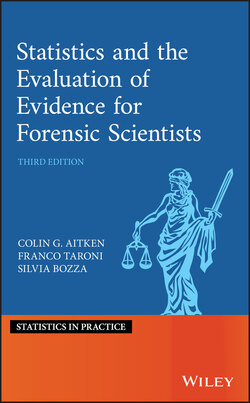Читать книгу Statistics and the Evaluation of Evidence for Forensic Scientists - Franco Taroni - Страница 38
Second law of probability for dependent events
Оглавление(1.7)
Events and are said to be dependent if the knowledge that has occurred affects the probability that will occur, and vice versa. For example, let be the outcome of a draw of a card from a well‐shuffled pack of 52 playing cards. This card is not replaced in the pack so there are now only 51 cards in the pack. Let be the draw of a card from this reduced pack of cards. Let be the event ‘an Ace is drawn’. Thus = 4/52 = 1/13. (Note here the conditioning information that the pack is well‐shuffled, with its implication that each of the 52 cards is equally likely to be drawn has been omitted for simplicity of notation; explicit mention of will be omitted in many cases but its existence should never be forgotten.) Let be the event ‘an Ace is drawn’ also. Then is the probability that an Ace was drawn at the second draw, given that an Ace was drawn at the first draw (and given everything else that is known, in particular that the first card was not replaced). There are 51 cards at the time of the second draw of which 3 are Aces. (Remember that an Ace was drawn the first time which is the information contained in .) Thus . It is now possible to formulate the third law of probability for dependent events.
